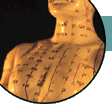|
 |
Introduction to TCM

Basics of TCM

• Yin-Yang | Five Elements

Zang-Fu Theories

• Zang Organs | Fu Organs

Classification of Antineoplastic Herbal Medicines

Characteristics of Herbal Medicines

Diagnose

• By Auscultation & Olfaction
• By Inspection

Prescriptions

Theories of Channels (Meridians) and Collaterals

Reference: A Modern View of the Immune System

Differentiation of Syndromes

• 8 Principles
• 6 Channels 4 Stages
• Syndromes of Zang-Fu Organs

Etiology

• Exogenous
| Pestilential
• Pathogenic Factors
• Emotional

Materia Medica


Back to Home

|
 |

Liver
The liver's main physiological functions and indicators are:
(1) storing blood;
(2) creating unrestrained conditions for qi;
(3) controlling the tendons and the luster reflected in the nails; and
(4) opening into the eye.
Storing Blood
The liver stores blood and regulates the volume of blood
circulation according to the needs of various tissues and organs.
During rest the amount of blood required by the body decreases and
the surplus is stored in the liver. During vigorous activity blood is
released from the liver to increase the volume of circulating blood.
As Wang Bin's Annotations on the Suwen notes, "The liver stores blood,
the heart circulates blood. When the body moves blood circulates
in the channels, when at rest it flows back to the liver." If the
liver's blood storage function is abnormal, there will be an affect
on normal body activities causing hemorrhagic diseases. For example,
if liver blood is deficient the following problems may appear:
the symptoms of vertigo, contracture of spasm of muscles and tendons,
impairment of flexion and extension of limbs or scanty
menstruation and amenorrhea.
Promotion of Unrestrained Conditions for Qi
Liver qi possesses the function of regulation.
It is responsible for the ascending, descending, and harmony of
bodily qi. If the body's qi activity is harmonious and its ascending
and descending are normal then the internal organs will continue
their normal physiological activities. This function of the
liver involves the following aspects:
The liver harmonizes the emotions. Traditional Chinese medicine
considers that the normal or abnormal function of an unrestrained
and free flowing qi is directly related to emotional activities,
and that the mental state is not only dominated by the heart but
also the liver. When qi activities are normal, the body has
a harmonious circulation of qi and blood, an easy mind and
happy emotions. If there is a dysfunction of qi's free flow,
it will directly affect the individual's emotional state.
For example, liver qi stagnation will give rise to stuffiness
and fullness of the chest, unhappy feelings, hypochondriasis, or even
mental depression, crying, irregular menstruation, etc.
If there is hyperactivity of the liver qi, there may be irritability,
anger, insomnia, dream disturbed sleep, dizziness, vertigo, a ringing
in the ear (tinnitus), or deafness. Any sudden change in the
normal pattern of the emotions, especially great anger or mental
depression, can affect and free flowing and spreading function of
liver qi resulting in the pathological changes of liver qi stagnation.
Liver qi regulation can assist the ascending function of the spleen
and the descending function of the stomach. This also involves bile
secretion. Bile is necessary for the digestion of food and drink.
If liver qi loses its harmonious flowing activities, it will affect the
digestive function of the spleen and stomach and the excretion of bile,
leading to the pathological symptoms of jaundice and bitter taste.
It is very common that patients with stagnation of liver qi may not
only have symptoms such as distension, pain in the chest and hypochondriac
regions, anxiety, and anger, but also belching due to the failure of
the stomach qi to descend and diarrhea caused by the dysfunctional
ascending of spleen qi. The former is known as "liver qi affecting
the stomach," and the latter as "disharmonious conditions between the
liver and the spleen."
Controlling the Tendons and the Luster Reflected in the Nails
The tendons, fascia, and ligaments of the body all rely on the nourishment
of liver blood. The movements of limbs and joints are not only the result
of tendon flexing but are also related to the strength or weakness of liver
blood. Only if liver blood is ample, can it nourish and supplement the
tendons to continue the normal movements of the limbs. If the liver blood
is insufficient and fails to nourish the tendons, the patient might experience
symptoms such as tremors of the hands or feet, numbness of the limbs,
or even difficulty in flexing and extending the limbs. If pathogenic heat
exhausts the body fluid leading to the consumption of blood, then this
will cause convulsion,, opisthotonos and lockjaw (trismus). As the
Suwen notes, "various kinds of wind diseases causing the eyes to state
upwards, twitching, dizziness, and vertigo, belong to the liver."
It is said that, "Nails are the remains of the tendons," The dryness
or moisture of the nails can reflect the sufficiency or insufficiency of
liver blood. When liver blood is plentiful the tendons are supple
and the nails appear hard and moist. If liver blood is insufficient
and incapable of nourishing the tendons, then the nails may be
thin, soft, brittle, and pale. The Suwen records, "The liver
communicates with the tendons. The health of the liver is reflected
in the luster of the nails."
Opening into the Eye
The essential qi of the five zang and six fu organs flows upwards
to nourish the eye. Thus those organs, especially the liver, have
a close relationship with the eye. The liver's function of storing
blood nourished the eye as its channel travels upwards connecting to
the eye system. In the Suwen it says, "Liver qi is in communication
with the eyes, so the eyes will be able to distinguish the five colors."
Thus an abnormality of liver function can affect the eyes.
If the liver blood is insufficient, there will be a dryness
of the eyes, blurred vision, or night blindness. If pathogenic
wind-heat attacks the liver channel, redness, swelling and pain in
the eyes will be the symptoms. If the liver fire flares up,
conjunctivitis may occur. If liver yang is in preponderance, dizziness
and vertigo occur. Liver wind stirring up produces convulsions
with the eyes staring upwards.
Related Subjects
Read more on other Zang Organs: Heart,
Lung,
Spleen, and
Kidney.
|

|
|
|
|
|
 |

|
WHAT IS TRADITIONAL CHINESE MEDICINE?

Photo © Image DJ Image Dictionary
With over 3000 years of experience, Traditional Chinese Medicine (TCM) has
remain one of the many fascinating areas in ancient Chinese culture.
First known to be documented in the Yellow Emperor's Canon of Medicine,
TCM is believed to have been practised in as early as 475 to 221 B.C.
The field of working knowledge of TCM stretches from anything related to
general healthcare practice to the philosophy of the mind, the logic of life,
religion, and even to as far as cosmology and astronumerology. This is why
in order to thoroughly understand the concepts behind TCM, one must be
comprehensive in learning and embracing the Chinese culture as a whole.
Just as Douglas Hoff put it when he explained about accupuncture, "The systems
of TCM uses the concepts of elements and meridians and are completely immersed
in the Asian cosmology which takes shape through the religions." The meridian-brain mechanism,
the fundamental working concept of acupuncture, in which the pain block from the message
that the needle or burning cone of herbs gives to the point of stimulus,
was only found centuries later by the West through science and technology.
|
| |
|
MESSAGE FROM THE EDITOR – MARCH 2020
 Thank you for visiting this TCM and acupuncture information website.
If you have previously been to this website, you might have
noticed that some of the pages on ancient historical ideas and
holistic thinkings related to Chinese metaphysics are temporarily taken offline.
This is because I will be revamping the whole website and be moving
those information into a new \"Ancient Chinese Culture\" section
so as to reflect a more current perspective on the interpretation
of some of the fundamental concepts as well as to include
some of the latest information in the area.
But if you have just found this website for the very first time, I welcome you again and
wish you could find what you require and, hopefully, you could also be benefitted
from reading the articles I published on this website.
Thank you for visiting this TCM and acupuncture information website.
If you have previously been to this website, you might have
noticed that some of the pages on ancient historical ideas and
holistic thinkings related to Chinese metaphysics are temporarily taken offline.
This is because I will be revamping the whole website and be moving
those information into a new \"Ancient Chinese Culture\" section
so as to reflect a more current perspective on the interpretation
of some of the fundamental concepts as well as to include
some of the latest information in the area.
But if you have just found this website for the very first time, I welcome you again and
wish you could find what you require and, hopefully, you could also be benefitted
from reading the articles I published on this website.
Please be patient and do come and check out this website frequently as it's being revamped.
Raymond Cheng, PhD DPA FRSA FRSPH

March 28, 2020.
|

|
IMPORTANT NOTICE AND DISCLAIMER

 This website is published, edited and designed by Raymond Cheng,
and reflects only and only his personal views and opinions in his individual capacity.
The information available at this website is not intended
directly or by implication to either diagnose or treat any
medical, emotional, or psychological condition or disorder.
It is also not intended to create a physician-patient relationship
between you and I or between you and Wyith Institute™ and The Office of Dr Raymond K K Cheng.
The information here is not a substitute for advice and treatment provided
by your physician or by another healthcare professional.
It is always recommended that consultation with local healthcare providers
be obtained for any of your specific health or medical concerns.
Furthermore, any products that can be purchased (yet you can see I don't have much
to sell here) through advertisers' banners or through links to other websites
are not either explicitly or implicitly given any warranty or endorsement
by me, my colleagues, Wyith Institute™ or any of its associated businesses.
This website is published, edited and designed by Raymond Cheng,
and reflects only and only his personal views and opinions in his individual capacity.
The information available at this website is not intended
directly or by implication to either diagnose or treat any
medical, emotional, or psychological condition or disorder.
It is also not intended to create a physician-patient relationship
between you and I or between you and Wyith Institute™ and The Office of Dr Raymond K K Cheng.
The information here is not a substitute for advice and treatment provided
by your physician or by another healthcare professional.
It is always recommended that consultation with local healthcare providers
be obtained for any of your specific health or medical concerns.
Furthermore, any products that can be purchased (yet you can see I don't have much
to sell here) through advertisers' banners or through links to other websites
are not either explicitly or implicitly given any warranty or endorsement
by me, my colleagues, Wyith Institute™ or any of its associated businesses.
|

|
|

 This website is published, edited and designed by Raymond Cheng,
and reflects only and only his personal views and opinions in his individual capacity.
The information available at this website is not intended
directly or by implication to either diagnose or treat any
medical, emotional, or psychological condition or disorder.
It is also not intended to create a physician-patient relationship
between you and I or between you and Wyith Institute™ and The Office of Dr Raymond K K Cheng.
The information here is not a substitute for advice and treatment provided
by your physician or by another healthcare professional.
It is always recommended that consultation with local healthcare providers
be obtained for any of your specific health or medical concerns.
Furthermore, any products that can be purchased (yet you can see I don't have much
to sell here) through advertisers' banners or through links to other websites
are not either explicitly or implicitly given any warranty or endorsement
by me, my colleagues, Wyith Institute™ or any of its associated businesses.
This website is published, edited and designed by Raymond Cheng,
and reflects only and only his personal views and opinions in his individual capacity.
The information available at this website is not intended
directly or by implication to either diagnose or treat any
medical, emotional, or psychological condition or disorder.
It is also not intended to create a physician-patient relationship
between you and I or between you and Wyith Institute™ and The Office of Dr Raymond K K Cheng.
The information here is not a substitute for advice and treatment provided
by your physician or by another healthcare professional.
It is always recommended that consultation with local healthcare providers
be obtained for any of your specific health or medical concerns.
Furthermore, any products that can be purchased (yet you can see I don't have much
to sell here) through advertisers' banners or through links to other websites
are not either explicitly or implicitly given any warranty or endorsement
by me, my colleagues, Wyith Institute™ or any of its associated businesses.



 Thank you for visiting this TCM and acupuncture information website.
If you have previously been to this website, you might have
noticed that some of the pages on ancient historical ideas and
holistic thinkings related to Chinese metaphysics are temporarily taken offline.
This is because I will be revamping the whole website and be moving
those information into a new \"Ancient Chinese Culture\" section
so as to reflect a more current perspective on the interpretation
of some of the fundamental concepts as well as to include
some of the latest information in the area.
But if you have just found this website for the very first time, I welcome you again and
wish you could find what you require and, hopefully, you could also be benefitted
from reading the articles I published on this website.
Thank you for visiting this TCM and acupuncture information website.
If you have previously been to this website, you might have
noticed that some of the pages on ancient historical ideas and
holistic thinkings related to Chinese metaphysics are temporarily taken offline.
This is because I will be revamping the whole website and be moving
those information into a new \"Ancient Chinese Culture\" section
so as to reflect a more current perspective on the interpretation
of some of the fundamental concepts as well as to include
some of the latest information in the area.
But if you have just found this website for the very first time, I welcome you again and
wish you could find what you require and, hopefully, you could also be benefitted
from reading the articles I published on this website.